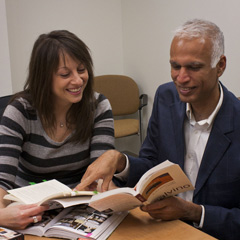Finding Meaning in Math
Michele Osherow admits it: she was a math-phobe.
As a professor of English and the dramaturge for the Folger Shakespeare Theatre, Osherow had managed to avoid the subject— until the Folger chose to stage the play Arcadia, which is based on the lives of mathematicians.
“I was stuck,” she said, “because I did not understand the sophistications of mathematics at all.”
Osherow turned to her UMBC colleague Manil Suri, a professor of mathematics and novelist, for help. She enjoyed their discussions so much that she invited him to talk to the actors; the actors found him so helpful that the theatre invited him to talk to the community; the community’s reaction was so positive that a video of Suri’s presentation has been viewed nearly 7,000 times.
Their joint effort might have ended there had Osherow not been leading UMBC’s Humanities Scholars program at the time, in which freshmen take a seminar that is usually team-taught by faculty in two different disciplines. “I couldn’t help but wonder if the excitement that I felt hearing mathematics described by Manil might be extended to these freshmen,” Osherow says, acknowledging that she felt some guilt for subjecting unsuspecting humanities students to mathematical concepts.
Suri saw things differently. “I was so excited – these poor humanities students had been deprived of math, and now I was going to bring them mathematics,” he said.
That tension—Suri’s excitement for math combined with Osherow’s discomfort with the subject— created a unique experience for freshmen last fall.
“I was pretty cautious at first,” said Christine Cruz ’15, history and political science. “As it turned out, math was so much more interesting than I gave it credit for. There is so much about it that actually applies to the humanities, and I discovered many connections between the two.”
Those points of connection were what the professors sought out in the course, starting with the assigned summer reading: The Curious Incident of the Dog in the Night-Time, a novel with a self-proclaimed mathematician as the protagonist. If students were surprised to be reading a book that featured math, Suri was in for a surprise as well.
“Suddenly I had thirteen papers to grade. I’ve never graded a paper before; I don’t think I’ve ever even written a paper before. It was horrifying – I spent three hours and hadn’t even graded one,” he laughed.
But the conflicts between the disciplines went deeper than questions of grading. One issue that confronted the two professors often was that of precision. Suri, as a mathematician, was accustomed to starting with a complicated problem and finding a concrete answer; in the humanities, students are taught to start with a specific source, such as a poem, and finish with a multilayered interpretation.
“Manil would say ‘mathematics is such a precise discipline,’ and I would say, ‘but so is poetry.’ The difference is that with poetry, the precision occurs in the creation of the piece,” said Osherow.
Over the semester, Osherow and Suri exchanged hundreds of e-mails, revised the syllabus and spent their weekends planning the next class. They explored topics such as patterns in literature, the media representation of mathematicians and how math can tell a story. Several months after the class ended, there are still topics that can prompt good-natured arguments between them, such as Osherow’s push to include King Lear because of the concept of “nothing,” which recurs throughout the play.
“If you told me a year ago that I would start off a lesson on King Lear by saying ‘King Lear was really bad at math,’ I would have said you were crazy,” Osherow said. Though Osherow included the text partially because, as a Shakespeare scholar, she felt that it was something she understood well, her own comprehension of it evolved throughout the class discussions. Although the professors set out to discuss the play as it related to the mathematical idea of “zero,” they soon discovered that the play also explored human worth and how that worth is calculated.
Exploring themes in the text that were new even to the professors teaching them was both challenging and fascinating for students. “[The King Lear unit] was something I struggled with,” said Desiree Sterling ’15, interdisciplinary studies. “Yet, it was still a connection worth considering and I was inspired by the interesting ideas exchanged during this unit.”
The course wrapped up with students creating projects that combined math and the humanities. For both the students and the professors, the course has affected their thinking in lasting ways. “I think the students figured out a way to exist in a world, and a university, where they’re going to have to approach topics of different degrees of difficulty that are both within and without their field,” said Suri.
Cruz agrees. “The course showed me I have the capacity to understand more about difficult subjects than I gave myself credit for, and it also helped me branch out and think critically in ways that I hadn’t before,” she said.
“It was absolutely a challenge, but I am very proud to have participated in this seminar,” said Osherow. “I think that a place like UMBC, which so fosters interdisciplinary approaches to teaching and research, was the ideal place to do it.”
Read a related article by Osherow and Suri in “The Chronicle of Higher Education”
Below, see a video where Osherow and Suri discuss the course:
(3/13/12)

